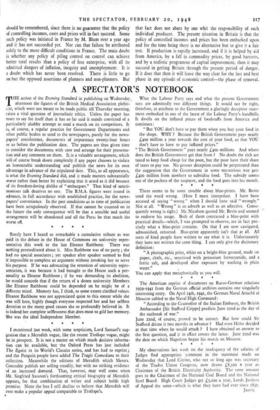A SPECTATOR 'S NOTEBOOK
THE action of the Evening Standard in publishing on Wednesday. afternoon the figures of the British Medical Association plebis- cite, which were not meant to be made public till Thursday morning, raises a vital question of journalistic ethics. Unless the paper has more to say for itself than it has so far said it stands convicted of a particularly shabby attempt to steal a march on its competitors. It is, of course, a regular practice for Government Departments and other public bodies to send to the newspapers, purely for the news- papers' convenience, documents of importance twenty-four hours or so before the publication date. The papers are thus given time to consider the documents with care and arrange for their presenta- tion and any comment on them. his a valuable arrangement, which will of course break down completely if any paper chooses to violate an honourable understanding and publish the news for its own advantage in advance of the stipulated date. This, to all appearance, is what the Evening Standard did, and it made matters substantially worse rather than better by explaining that it acted as it did because of its freedom-loving dislike of " embargoes." That kind of sancti- monious talk deceives no one. The B.M.A. figures were issued in advance, in full accordance with established practice, for the news- papers' convenience. In the past conditions as to time of publication have been scrupulously observed. If that cannot be counted on in the future the only consequence will be that a sensible and useful arrangement will be abandoned and all the Press be that much the worse off.
* * * *






























 Previous page
Previous page